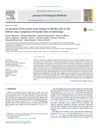 1 citations,
February 2021 in “Cosmetics”
1 citations,
February 2021 in “Cosmetics” Fagraea berteroana fruit extract may promote hair growth by affecting cell proliferation and hair growth pathways.
 26 citations,
October 2017 in “Scientific reports”
26 citations,
October 2017 in “Scientific reports” A special microbe helps plants absorb rock phosphate by growing on their root hairs.
 December 2006 in “International Journal of Dermatology”
December 2006 in “International Journal of Dermatology” Mnemonics with one letter are useful and easy to remember for learning dermatology.
 November 2023 in “Journal of plant nutrition and soil science”
November 2023 in “Journal of plant nutrition and soil science” Boron deficiency in maize affects leaf boron levels and nutrient uptake differently depending on root hair presence and soil type.
 10 citations,
January 2012 in “International Journal of Trichology”
10 citations,
January 2012 in “International Journal of Trichology” The study found no link between anxiety, vitamin B12, folate, TSH, ferritin, zinc levels, and trichodynia in telogen alopecia patients.
 February 2024 in “Bioengineering”
February 2024 in “Bioengineering” The hydrogel made of chitosan, HPMC, and insulin speeds up wound healing and could be a new dressing, especially for diabetics.
 5 citations,
January 2009 in “Elsevier eBooks”
5 citations,
January 2009 in “Elsevier eBooks” Bayesian networks are tools for modeling variables' probabilistic relationships, which can efficiently represent complex probabilities and help in making inferences.
 29 citations,
February 2013 in “Proceedings of the National Academy of Sciences of the United States of America”
29 citations,
February 2013 in “Proceedings of the National Academy of Sciences of the United States of America” Loss of Fz6 disrupts hair follicle and associated structures' orientation.
 4 citations,
October 2018 in “Asia-Pacific Journal of Clinical Oncology”
4 citations,
October 2018 in “Asia-Pacific Journal of Clinical Oncology” CDK4/6 inhibitors have improved treatment outcomes for certain advanced breast cancer patients.

Drinking sweetened tea and poor sleep habits may increase the risk of hair loss in women.

Drinking sweetened tea and poor sleep increase the risk of hair loss in women.

Drinking sweetened tea and poor sleep habits increase the risk of hair loss in women.

Drinking sweetened tea and late bedtimes increase the risk of hair loss in women.

Drinking sweetened tea and late bedtimes increase the risk of hair loss in women.

Iron and zinc deficiencies may be treated to help female hair loss.
 136 citations,
May 2016 in “Phytotherapy Research”
136 citations,
May 2016 in “Phytotherapy Research” Turmeric may have benefits for skin health, but more research is needed to confirm its effectiveness.
 83 citations,
June 2020 in “Materials & Design”
83 citations,
June 2020 in “Materials & Design” Sponge helps heal wounds faster with less inflammation and better skin/hair growth.
 76 citations,
January 2019 in “Nanoscale”
76 citations,
January 2019 in “Nanoscale” Created material boosts hair growth and kills bacteria for wound healing.
 65 citations,
January 2011 in “Frontiers in Endocrinology”
65 citations,
January 2011 in “Frontiers in Endocrinology” Neurosteroids show promise for treating epilepsy and more research is needed.
 49 citations,
April 2000 in “Journal of The American Academy of Dermatology”
49 citations,
April 2000 in “Journal of The American Academy of Dermatology” Despite progress in treatment, the exact cause of Alopecia areata is still unknown.
 41 citations,
March 2010 in “Psychology Research and Behavior Management”
41 citations,
March 2010 in “Psychology Research and Behavior Management” Using psychological treatments can help manage skin conditions along with regular medical care.
 39 citations,
September 2016 in “Expert Opinion on Drug Delivery”
39 citations,
September 2016 in “Expert Opinion on Drug Delivery” New drug delivery methods can make natural compounds more effective and stable.
 21 citations,
November 2020 in “Chemical Engineering Journal”
21 citations,
November 2020 in “Chemical Engineering Journal” The hydrogel with silver and mangiferin helps heal wounds by killing bacteria and aiding skin and tissue repair.
 16 citations,
December 2006 in “International Journal of Dermatology”
16 citations,
December 2006 in “International Journal of Dermatology” A woman died from cancer that spread from a long-standing cyst on her abdomen.
 11 citations,
September 2016 in “Journal of virological methods”
11 citations,
September 2016 in “Journal of virological methods” Rabies virus was found in specific skin cells of rabid dogs' muzzles, suggesting these cells could help diagnose rabies.
 10 citations,
January 2015 in “Przeglad Menopauzalny”
10 citations,
January 2015 in “Przeglad Menopauzalny” Progestogens are essential in menopausal hormone therapy to prevent uterine cancer and must be chosen carefully based on individual needs.
 6 citations,
April 2019 in “Russkij žurnal detskoj nevrologii”
6 citations,
April 2019 in “Russkij žurnal detskoj nevrologii” Some epilepsy drugs can cause reproductive and cosmetic side effects in women and affect pregnancy, but most women still have healthy babies.
 5 citations,
December 1942 in “Journal of the American Medical Association”
5 citations,
December 1942 in “Journal of the American Medical Association” Choline and biotin are important for liver health and preventing certain deficiencies in animals, and more research is needed to understand their benefits in humans.
 4 citations,
January 2013 in “Acta dermato-venereologica”
4 citations,
January 2013 in “Acta dermato-venereologica” Some patients with Alopecia Areata experience itch due to immune cells and enzymes that cause itching.
 3 citations,
September 2023 in “Frontiers in immunology”
3 citations,
September 2023 in “Frontiers in immunology” Chronic inflammatory skin diseases are caused by disrupted interactions between skin cells and immune cells.






























